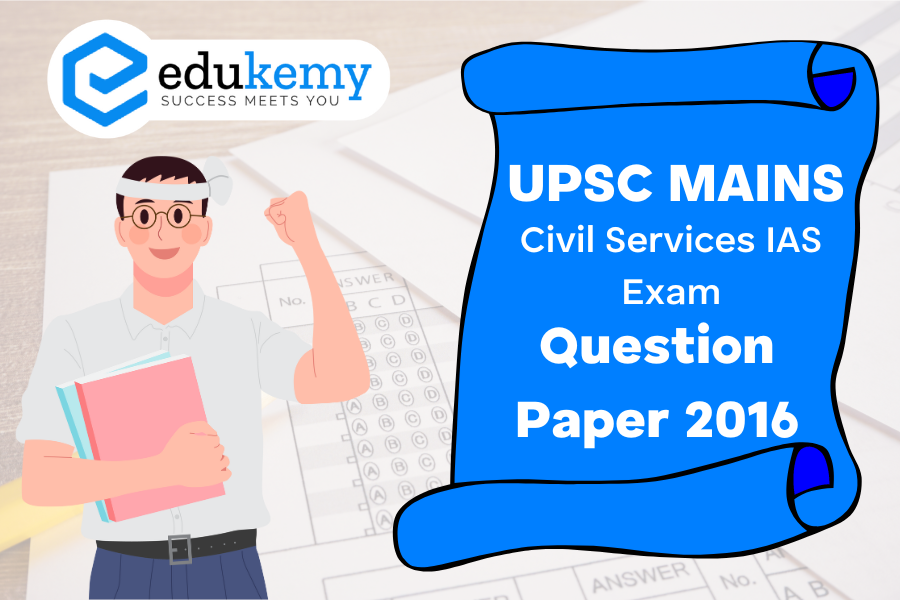
Practicing with the previous year’s UPSC question papers is a highly recommended strategy to understand the nature of the exam. Solving authentic IAS question paper will give you a true sense of the pattern and style of questions that will be asked on the UPSC Mains exam.
Once the recruitment process is complete, the conducting body releases official UPSC previous year question papers PDFs along with their answer keys. It is crucial for IAS exam candidates to focus on solving and answering these questions to grasp the level of difficulty of the examination.
This article presents the previous year’s UPSC main question paper of 2016. Doing well on these papers will boost a candidate’s confidence and assist them in identifying the most important topics from the civil services exam perspective.
Contents
- 1 UPSC Mains General Studies Paper – 1 Mains 2016
- 2 UPSC Mains General Studies Paper – 2 Mains 2016
- 3 UPSC Mains General Studies Paper – 3 Mains 2016
- 4 UPSC Mains General Studies Paper – 4 Mains 2016
- 5 Frequently Asked Questions (FAQs)
- 5.1 1. Q: What is the format of the UPSC Mains Civil Services IAS Question Paper in 2016?
- 5.2 2. Q: How many papers are there in the UPSC Mains Civil Services IAS Exam in 2016?
- 5.3 3. Q: Are there any changes in the UPSC Mains Exam pattern for 2016?
- 5.4 4. Q: Can I use a pen or pencil for writing answers in the UPSC Mains Exam?
- 5.5 5. Q: How are the Optional Subject papers structured in the UPSC Mains Civil Services IAS Exam 2016?
- 6 To get free counseling/support on UPSC preparation from expert mentors please call 9773890604
UPSC Mains General Studies Paper – 1 Mains 2016
4. Discuss the role of women in the freedom struggle especially during the Gandhian phase.
6. Has the formation of linguistic states strengthened the cause of Indian unity?
8. To what extent globalisation has influenced the core of cultural diversity in India? Explain.
13. Discuss the concept of air mass and explain its role in macro-climatic changes.
16. South China Sea has assumed great geopolitical significance in the present context. Comment.
17. Major cities of India are becoming vulnerable to flood conditions. Discuss.
19. Enumerate the problems and prospects of inland water transport in India.
UPSC Mains General Studies Paper – 2 Mains 2016
7. Did the Government of India Act, 1935 lay down a federal constitution? Discuss.
8. What is quasi judicial body? Explain with the help of concrete examples.
UPSC Mains General Studies Paper – 3 Mains 2016
8. What is allelopathy? Discuss its role in major cropping systems of irrigated agriculture.

UPSC Mains General Studies Paper – 4 Mains 2016
SECTION – A
1. (a) Explain how ethics contributes to social and human well-being. (150 words) 10 marks
(b) Discuss Mahatma Gandhi’s concept of seven sins. (150 words) 10
3. (a) Analyse John rawls’s concept of social justice in the Indian Context. (150 word) 10
(a) Discuss how they achieve this objective.
(b) Giving examples, show how the two differ in their approaches. (150 words) 10 marks.
6. Our attitudes towards life, work, other people and society are generally shaped unconsciously by the family and the social surroundings in which we grow up. Some of these unconsciously acquired attitudes and values are often undesirable in the citizens of a modern democratic and egalitarian society.
(a) Discuss such undesirable values prevalent in Today’s educated Indians
7. Anger is a harmful negative emotion. It is injurious to both personal life and work life.
(a) Discuss how it leads to negative emotions and undesirable behaviors.
(b) How can hit be managed and controlled? (150 words) 10 marks
SECTION – B
Frequently Asked Questions (FAQs)
1. Q: What is the format of the UPSC Mains Civil Services IAS Question Paper in 2016?
A: The UPSC Mains Civil Services IAS Question Paper in 2016 follows a descriptive format, consisting of essay-type questions and various papers covering subjects such as General Studies, Optional Subjects, and qualifying language papers.
2. Q: How many papers are there in the UPSC Mains Civil Services IAS Exam in 2016?
A: The UPSC Mains Civil Services IAS Exam in 2016 comprises a total of 9 papers, including two qualifying language papers. The rest of the papers cover General Studies, Essay, and Optional Subjects chosen by the candidates.
3. Q: Are there any changes in the UPSC Mains Exam pattern for 2016?
A: It’s advisable to check the latest UPSC notifications for any updates or changes in the exam pattern for the year 2016.
4. Q: Can I use a pen or pencil for writing answers in the UPSC Mains Exam?
A: Candidates are required to write their answers in the UPSC Mains Exam using a black ballpoint pen only. Pencils are not allowed for writing answers.
5. Q: How are the Optional Subject papers structured in the UPSC Mains Civil Services IAS Exam 2016?
A: Each Optional Subject in the UPSC Mains Exam consists of two papers (Paper-I and Paper-II), each carrying 250 marks. The syllabus for Optional Subjects is specified by the UPSC, and candidates can choose from a list of approved subjects based on their interests and expertise.
To get free counseling/support on UPSC preparation from expert mentors please call 9773890604
- Join our Main Telegram Channel and access PYQs, Current Affairs and UPSC Guidance for free – Edukemy for IAS
- Learn Economy for free- Economy for UPSC
- Mains Answer Writing Practice-Mains Answer Writing
- For UPSC Prelims Resources, Click here


